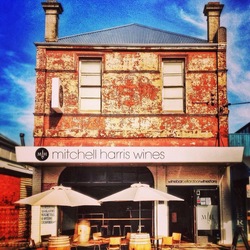Frankland Estate
Alter Weg Riesling
 Western Australia, Australia
Western Australia, Australia

Been a fan of this cuvee since it's inception. To me, this is about as close as Aussie riesling gets to its German counterpart. Neither a good or bad thing, but I love that link between two countries I adore in this wine. That said, this was one of the best Aussie rieslings I've had all year.
German inspired methods on Western Australian fruit. From Frankland Estate's website:
All riesling grapes are harvested as cool as possible and pressed immediately, slow press cycles allow for soft and long extraction. Blocks and picks are kept separate and some juice from most blocks is fermented in barrel format for interest and comparison purposes. Picking decisions are made on ripeness and fruitfulness, with the main aim of working with natural balance yet intentionally look for greater ripeness with this wine and as a result greater degree of phenolic influence and texture. Juice is sent to tank to settle overnight (without enzyme or any additions). A cloudy juice is run to a combination of 1000ltr and 500ltr barrels. Fermentation is spontaneous and temperature controlled to some degree but temperature range is generally higher than tank fermentations. Post fermentation barrels are topped and left un-sulphured through to spring time quite often if residual sugars are high fermentation will be left to start again in spring as juice warms. Sulphur will be introduced when a decision is made on the vitality/fruitfulness of the wine and residual sugar is seen to be in balanced with the wine. Wine was left in barrel for 10 months (January).
The resulting wine is textural, spicy, and generous. Doesn't quite have the extract of German rieslings, but there's length, balance, and most importantly, it's uniquely its own wine. I feel that the provenance of the fruit shines through all that winemaking - that crunchy fruit-first with more green apple/citrus than stone fruits, steeliness, and light whiff of smoke/petrol. It's also remarkably clean for a barrel-treated wine (say compared to Koehler-Ruprecht or JB Becker). Enough with the rant because the takeaway is that it's delicious!
Been a fan of this cuvee since it's inception. To me, this is about as close as Aussie riesling gets to its German counterpart. Neither a good or bad thing, but I love that link between two countries I adore in this wine. That said, this was one of the best Aussie rieslings I've had all year.
German inspired methods on Western Australian fruit. From Frankland Estate's website:
All riesling grapes are harvested as cool as possible and pressed immediately, slow press cycles allow for soft and long extraction. Blocks and picks are kept separate and some juice from most blocks is fermented in barrel format for interest and comparison purposes. Picking decisions are made on ripeness and fruitfulness, with the main aim of working with natural balance yet intentionally look for greater ripeness with this wine and as a result greater degree of phenolic influence and texture. Juice is sent to tank to settle overnight (without enzyme or any additions). A cloudy juice is run to a combination of 1000ltr and 500ltr barrels. Fermentation is spontaneous and temperature controlled to some degree but temperature range is generally higher than tank fermentations. Post fermentation barrels are topped and left un-sulphured through to spring time quite often if residual sugars are high fermentation will be left to start again in spring as juice warms. Sulphur will be introduced when a decision is made on the vitality/fruitfulness of the wine and residual sugar is seen to be in balanced with the wine. Wine was left in barrel for 10 months (January).
The resulting wine is textural, spicy, and generous. Doesn't quite have the extract of German rieslings, but there's length, balance, and most importantly, it's uniquely its own wine. I feel that the provenance of the fruit shines through all that winemaking - that crunchy fruit-first with more green apple/citrus than stone fruits, steeliness, and light whiff of smoke/petrol. It's also remarkably clean for a barrel-treated wine (say compared to Koehler-Ruprecht or JB Becker). Enough with the rant because the takeaway is that it's delicious!







